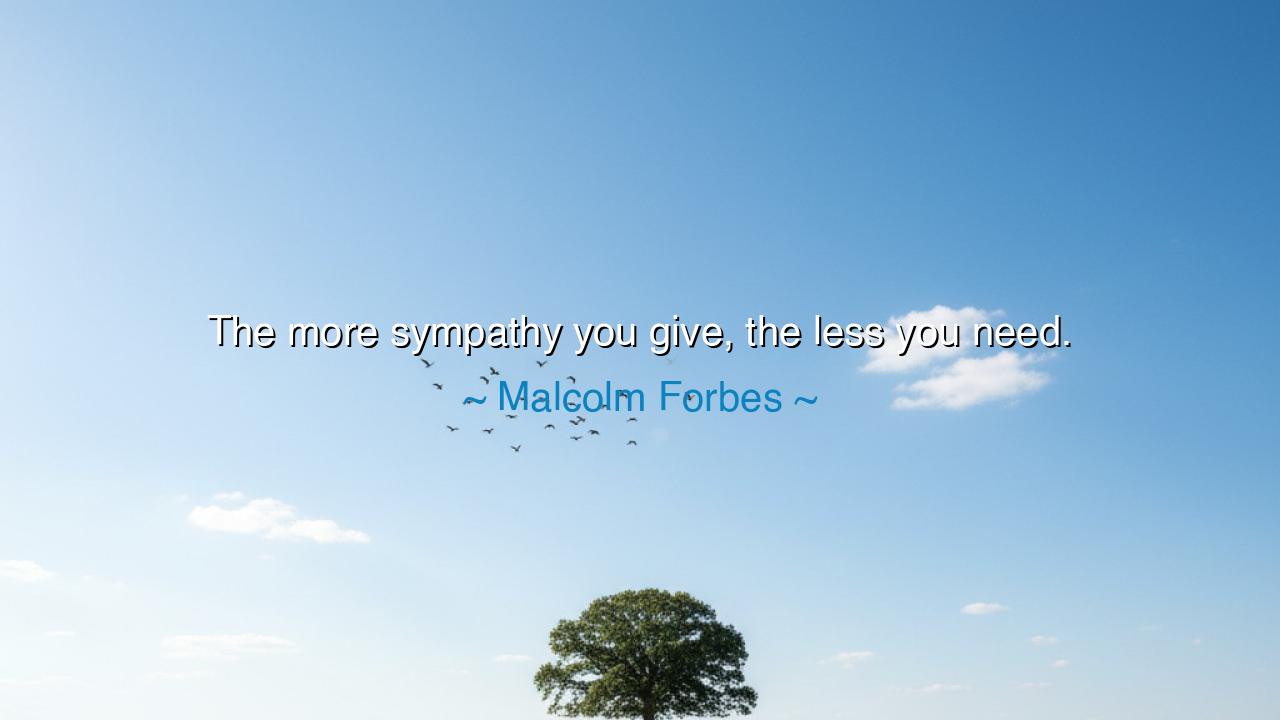
The more sympathy you give, the less you need.






Hear the words of Malcolm Forbes, a man who knew both fortune and the hearts of men: “The more sympathy you give, the less you need.” At first these words seem paradoxical, but within them lies a truth as enduring as the mountains: that generosity of spirit strengthens the soul, while self-pity weakens it. The one who gives comfort to others finds themselves lifted, no longer hungry for the same comfort; but the one who clings to their own sorrow without giving becomes hollow, endlessly craving.
The meaning of this saying is found in the strange alchemy of the heart. When we turn outward in compassion, offering sympathy to those who are burdened, our own burdens grow lighter. It is as though the act of giving heals us, filling us with strength that no self-centered grieving could ever bring. To extend kindness is to drink from a hidden spring of resilience. Thus Forbes tells us: the more we console others, the less we find ourselves in need of consolation.
Consider the tale of Florence Nightingale, who in the horror of the Crimean War moved among the wounded and dying with tireless compassion. She gave sympathy unstintingly to the soldiers who suffered, binding wounds and bringing light into their despair. Yet in giving so much, she herself grew strong. Her life, though marked by illness, was not crushed by need for comfort, for her heart was sustained by the very sympathy she gave. Her legacy shows the wisdom of Forbes: the healer who gives solace finds themselves less in need of solace.
The ancients also spoke of this mystery. The Stoics taught that self-pity is a chain that binds the spirit, but compassion frees it. Marcus Aurelius, emperor and philosopher, wrote in his meditations that a man is made stronger not by being pitied, but by serving others, by being part of the great fellowship of humanity. He knew, as Forbes declared, that turning outward diminishes one’s own neediness, for service fills the soul with dignity and purpose.
This truth is also evident in ordinary life. Think of those who have known grief, yet in their mourning choose to comfort others who suffer. Such people often discover that their own wounds begin to heal faster. By lifting another, they lift themselves. It is not that sorrow vanishes, but that it no longer dominates, for compassion gives the soul fresh strength and meaning. The act of giving sympathy transforms pain into power.
The lesson for us is plain: if you find yourself in need of comfort, do not turn inward alone—turn outward. Seek someone else who suffers and give them sympathy. Listen to them, stand with them, weep with them if need be. In doing so, you will discover that your own hunger for sympathy lessens. For the heart, like a lamp, shines brighter the more it shares its flame. The one who hoards compassion is left in darkness, but the one who gives finds themselves bathed in light.
So, children of tomorrow, engrave this wisdom upon your lives: the secret to needing less is to give more. Do not wait until you are whole before offering sympathy; it is in the act of giving that wholeness is found. When you comfort, you are comforted. When you strengthen another, you are made strong. As Malcolm Forbes proclaimed, “The more sympathy you give, the less you need.” And in this truth lies both the cure for sorrow and the path to greatness of spirit.






AAdministratorAdministrator
Welcome, honored guests. Please leave a comment, we will respond soon